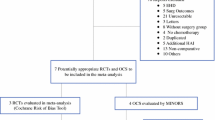Abstract
Background
This study investigated the impact of perioperative systemic chemotherapy on the recurrence rate and pattern following resection of colorectal liver metastases.
Methods
A retrospective cohort study was conducted in two centers. Rates and patterns of recurrence and overall survival (OS) were compared between patients treated with and without perioperative systemic chemotherapy. The clinical risk score (CRS) was used to stratify patients in low risk (CRS 0–2) and high risk (CRS 3–5) of recurrence.
Results
A total of 2020 patients were included, of whom 1442 (71%) received perioperative systemic chemotherapy. The median follow-up was 88 months, and 1289 patients (64%) developed a recurrence. The recurrence pattern was independent of chemotherapy in low-risk patients: intrahepatic recurrences (30% vs. 30%, p = 0.97) and extrahepatic recurrences (38% vs. 39%, p = 0.52). In high-risk patients, no difference in intrahepatic recurrences was found (48% vs. 50%, p = 0.59). However, a lower rate of extrahepatic recurrences (43% vs. 55%, p = 0.007) was observed with perioperative systemic chemotherapy, mainly due to a reduction in pulmonary recurrences (25% vs. 35%, p = 0.007). In competing risk analysis, the cumulative incidence of extrahepatic recurrence was significantly lower with perioperative systemic chemotherapy in high-risk patients only (5-year cumulative incidence 44% vs. 59%, p < 0.001). Perioperative chemotherapy was associated with improved OS in high-risk patients (adjusted HR 0.73, 95% CI 0.57–0.94, p = 0.02), but not in low-risk patients (adjusted HR 0.99, 95% CI 0.82–1.19, p = 0.90).
Conclusions
Perioperative systemic chemotherapy had no association with intrahepatic recurrence, but was associated with fewer pulmonary recurrences and superior OS in high-risk patients only.




Similar content being viewed by others
References
Tomlinson JS, Jarnagin WR, DeMatteo RP et al (2007) Actual 10-year survival after resection of colorectal liver metastases defines cure. J Clin Oncol 25:4575–4580
Nordlinger B, Sorbye H, Glimelius B et al (2013) Perioperative FOLFOX4 chemotherapy and surgery versus surgery alone for resectable liver metastases from colorectal cancer (EORTC 40983): long-term results of a randomised, controlled, phase 3 trial. Lancet Oncol 14:1208–1215
Ayez N, van der Stok EP, Grunhagen DJ et al (2015) The use of neo-adjuvant chemotherapy in patients with resectable colorectal liver metastases: clinical risk score as possible discriminator. Eur J Surg Oncol 41(7):859–867
Rahbari NN, Reissfelder C, Schulze-Bergkamen H et al (2014) Adjuvant therapy after resection of colorectal liver metastases: the predictive value of the MSKCC clinical risk score in the era of modern chemotherapy. BMC Cancer 14:174
Parks R, Gonen M, Kemeny N et al (2007) Adjuvant chemotherapy improves survival after resection of hepatic colorectal metastases: analysis of data from two continents. J Am Coll Surg 204:753–761 (discussion 761–753)
Fong Y, Fortner J, Sun RL et al (1999) Clinical score for predicting recurrence after hepatic resection for metastatic colorectal cancer: analysis of 1001 consecutive cases. Ann Surg 230:309–318 (discussion 318–321)
Gray RJ (1988) A class of K-sample tests for comparing the cumulative incidence of a competing risk. Ann Stat 16:1141–1154
De Jong MC, Pulitano C, Ribero D et al (2009) Rates and patterns of recurrence following curative intent surgery for colorectal liver metastasis: an international multi-institutional analysis of 1669 patients. Ann Surg 250:440–447
Hallet J, Sa Cunha A, Adam R et al (2016) Factors influencing recurrence following initial hepatectomy for colorectal liver metastases. Br J Surg 103(10):1366–1376
Primrose J, Falk S, Finch-Jones M et al (2014) Systemic chemotherapy with or without cetuximab in patients with resectable colorectal liver metastasis: the New EPOC randomised controlled trial. Lancet Oncol 15:601–611
Mitry E, Fields AL, Bleiberg H et al (2008) Adjuvant chemotherapy after potentially curative resection of metastases from colorectal cancer: a pooled analysis of two randomized trials. J Clin Oncol 26(30):4906–4911
Nordlinger B, Sorbye H, Glimelius B et al (2013) Perioperative FOLFOX4 chemotherapy and surgery versus surgery alone for resectable liver metastases from colorectal cancer (EORTC 40983): long-term results of a randomised, controlled, phase 3 trial. Lancet Oncol 14:1208–1215
Frentzas S, Simoneau E, Bridgeman VL et al (2016) Vessel co-option mediates resistance to anti-angiogenic therapy in liver metastases. Nat Med 22(11):1294–1302
van Dam PJ, van der Stok EP, Teuwen LA et al (2017) International consensus guidelines for scoring the histopathological growth patterns of liver metastasis. Br J Cancer 117(10):1427–1441
Margonis GA, Buettner S, Andreatos N et al (2018) Association of BRAF mutations with survival and recurrence in surgically treated patients with metastatic colorectal liver cancer. JAMA Surg 153:e180996
Margonis GA, Kim Y, Sasaki K et al (2016) Codon 13 KRAS mutation predicts patterns of recurrence in patients undergoing hepatectomy for colorectal liver metastases. Cancer 122:2698–2707
Vauthey JN, Zimmitti G, Kopetz SE et al (2013) RAS mutation status predicts survival and patterns of recurrence in patients undergoing hepatectomy for colorectal liver metastases. Ann Surg 258:619–626
Margonis GA, Sasaki K, Gholami S et al (2018) Genetic and morphological evaluation (GAME) score for patients with colorectal liver metastases. Br J Surg 105(9):1210–1220
Funding
None.
Author information
Authors and Affiliations
Corresponding author
Ethics declarations
Conflict of interest
The authors have no conflict of interest.
Informed consent
No informed consent was required.
Additional information
Publisher's Note
Springer Nature remains neutral with regard to jurisdictional claims in published maps and institutional affiliations.
Rights and permissions
About this article
Cite this article
Buisman, F.E., Galjart, B., van der Stok, E.P. et al. Recurrence Patterns After Resection of Colorectal Liver Metastasis are Modified by Perioperative Systemic Chemotherapy. World J Surg 44, 876–886 (2020). https://doi.org/10.1007/s00268-019-05121-9
Published:
Issue Date:
DOI: https://doi.org/10.1007/s00268-019-05121-9






